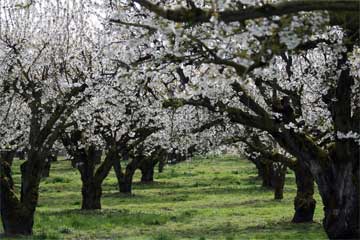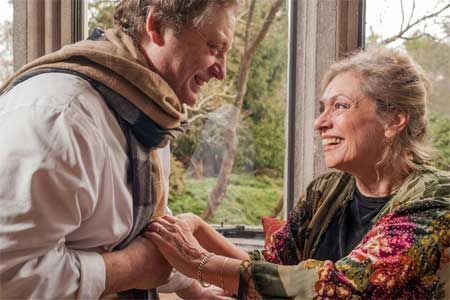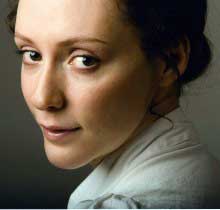Play (1904)
by Anton Chekhov
Translated by Melia Bensussen & The Cherry Orchard Company
Directed by Melia Bensussen
Actors’ Shakespeare Project
Pine Manor College
Chestnut Hill, MA
February 12 – March 9, 2014
With Marya Lowry (Madame Ranevskaya), Lydia Barnett-Mulligan (Anya), Marianna Bassham (Varya), Richard Snee (Gaev), Steven Barkhimer (Lopakhin), Danny Bryck (Trofimov), Jake Berger (Simeonov-Pishchik), Sarah Newhouse (Charlotta Ivanovna), Gabe Braetz (Yepikhodov), Esme Allen (Dunyasha), Arthur Waldstein (Fiers), Mac Young (Yasha)

The country estate of Madame Ranevskaya is in financial trouble, and, as she returns from a long sojourn in Paris to address the issue, it becomes clear that cutting down the beloved cherry orchard and building houses will be the only salvation. Nevertheless, old world values preventing such an action come into conflict with modern realities as the fortunes of the landed gentry blindly wane.
Apparently Chekhov regarded this, his last play, which does seem all that funny, as a comedy. It is, I suppose, a comedy of manners, and though not providing too many laughs, gives a prevailing sense of irony about the interaction between social classes in transition.
Oddly, Chekhov is the sort of writer whose work comes across as exquisitely wry and poignant when it is tuned just so, and somewhat laborious and uneventful otherwise. The dramatic interchanges in the works are subtle and have greatest impact when they are finely targeted. Without that, there is a sense of wandering malaise and a feeling of irresolution without punctuation.

Marya Lowry as Madame Ranevskaya
Photo: Stratton McCrady Photography
Courtesy of Actors’ Shakespeare Project
The very fine Actors’ Shakespeare Project, now in its tenth year, has an incredibly high success rate with its standard fare, the Shakespearean corpus, delivering far more often than not; its inventive and energetic interpretations of those great works are very high on the directorial and acting scales while managing productions in a wide variety of venues. Occasionally, it has done works by others and sometimes the results are interesting and fulfilling. Last season’s production of Middletown by Will Eno was a particularly successful case in point.
The current production takes place in a beautiful, warm and lavish, drawing room, very well suited to the aristocratic setting of the play. The audience is seated around the sides as the action goes on in the center, creating a great sense of intimacy, a species of production at which the Actors’ Shakespeare Project is particularly adept.
The cast is filled with some company notables.
Marya Lowry, in the focal role of Madame Ranevskaya, has a regally sensuous, but wounded, bearing that carries well the combination of financially-endangered aristocracy, family tragedy and foreign escape. She has a warm charisma that conveys a glittering charm that has come and almost gone, leaving hints and echoes of days past.
Steve Barkimer, as the serf turned rich merchant Lopakhin, delivers robust fiduciary confidence seasoned with childish wonder that he has made it so far. When he erupts into self-conscious laughter at the financial turn of events in the second half, this juvenile glee barely contains itself. Barkhimer is one of the company’s long-standing comic actors and it is curious and much to the point that in this show he carries this merchant role with a good deal of an internalized grin.

Photo: Courtesy of Actors’ Shakespeare Project
Marianna Bassham has perhaps the most penetrating and tragic role, that of Varya, the aging (though she is only 27) adopted daughter of Madame Ranevskaya who is thrust into the position of potential matrimony as a way of saving the estate. Bassham gives Varya a sustained anguish which is difficult to watch but extremely effective. The shadow she casts through the conjunction of familial obligation and personal loss of faith is wrenchingly dark and deep.
Esme Allen, a relative newcomer to the troupe who showed her stuff in The Merry Wives of Windsor two seasons ago, offers a demonstrative hauteur as Dunyasha, the up and coming maid who is caught in a love triangle.
Sarah Newhouse, another company veteran, struts her stuff as Charlotta Ivanovna in a kind of a Marlene Dietrich whirl, full of circus splendor.
Though the subject of the play is inherently about the languor and inattention of the disappearing upper classes, its best renditions somehow manage to contextualize that sense of dissipation and vacancy of energy within a frame that has enough vim and vigor to keep things rolling. The current production has its charms, but I would say that it is a bit on the languorous side itself, a little too infected by the tone it is meant to display.
Though the perkiness of some of the characters punctuates that elongation of mood, it is not quite enough in this production to make it rise energetically out of the doldrums it depicts. Nevertheless, the friend with whom I saw the show rose joyfully and appreciatively to his feet in applause at the conclusion, that tone and execution having worked brilliantly well for him.
– BADMan
Leave a Reply